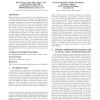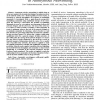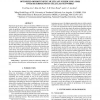245 search results - page 29 / 49 » A low power scheduler using game theory |
123
Voted
ICS
2005
Tsinghua U.
15 years 6 months ago
2005
Tsinghua U.
Traditionally, scheduling in high-end parallel systems focuses on how to minimize the average job waiting time and on how to maximize the overall system utilization. Despite the d...
113
click to vote
DAC
2003
ACM
16 years 1 months ago
2003
ACM
Power dissipation is becoming the most challenging design constraint in nanometer technologies. Among various design implementation schemes, standard cell ASICs offer the best pow...
110
Voted
TON
2012
13 years 3 months ago
2012
—Anonymous wireless networking is studied when an adversary monitors the transmission timing of an unknown subset of the network nodes. For a desired quality of service (QoS), as...
121
click to vote
INFOCOM
2010
IEEE
14 years 11 months ago
2010
IEEE
—With the convergence of multimedia applications and wireless communications, there is an urgent need for developing new scheduling algorithms to support real-time traffic with ...
122
click to vote
ICASSP
2009
IEEE
15 years 4 months ago
2009
IEEE
Optimized opportunistic multicast scheduling (OMS) has been studied previously by the authors for homogeneous cellular networks, where the problem of efficiently transmitting a co...



